Tutt* a chiacchierare!
Obiettivi per il capitolo
At the end of this chapter, students should be able to…
- identify typical activities and actions
- talk about their hobbies and pastimes
- describe their typical days
- ask about the hobbies and routines of their classmates
- tell time
- read a schedule or timetable
3.1 Introduzione al capitolo. Ascoltiamo!
Listen to the song “La prima cosa bella” performed by Malika Ayane (and written by Nicola di Bari) and complete the lyrics with the following words:
ho — senti (x3)—suono (x2) — canta (x3)— chiedo— profumi
| Ho preso la chitarra
e ________________________________________ per te il tempo di imparare non l’ho e non so suonare ma ________________________________________ per te. La ________________________________________ questa voce chi ________________________________________ è il mio cuore amore amore amore è quello che so dire ma tu mi capirai I prati sono in fiore ________________________________________ anche tu ________________________________________ voglia di morire non posso più cantare non ________________________________________ di più La prima cosa bella che ho avuto dalla vita è il tuo sorriso giovane, sei tu.
|
Tra gli alberi una stella
la notte si è schiarita il cuore innamorato sempre più sempre più La ________________________________________ questa voce chi ________________________________________ è il mio cuore amore amore amore è quello che so dire ma tu mi capirai I prati sono in fiore… La prima cosa bella che ho avuto dalla vita è il tuo sorriso giovane sei tu Tra gli alberi una stella la notte si è schiarita il cuore innamorato sempre più La ________________________________________ questa voce chi ________________________________________ è il mio cuore amore amore amore |
Esercizi
A. Vocabolario: ripasso degli aggettivi. Write the appropriate word under each image. Then, write 2 adjectives to describe each one. Pay attention to agreement!
| chitarra | stella | fiore | alberi | cuore | sorriso |
 |
 |
 |
| È un/a _______________________________________________________.
1. 2. |
È un/a _______________________________________________________.
1. 2. |
È un/a _______________________________________________________.
1. 2. |
 |
 |
 |
| Sono due _______________________________________________________.
1. 2. |
È un/a _______________________________________________________.
1. 2. |
È un/a _______________________________________________________.
1. 2. |
B. Comprensione. Answer the questions with complete sentences (in Italian!).
- Come si chiama la cantante? ___________________________________________________________
- Quanti anni ha (secondo te)? ___________________________________________________________
- Com’è? ___________________________________________________________
- Cosa fa (What does she do)? ___________________________________________________________
3.2 Vocabolario: attività e passatempi
Match the conjugated verbs from the song with their infinitive forms. Can you figure out what they mean? Are there any similar to English? You already know avere from Capitolo 2!
| suono | avere |
| chiedo | cantare |
| ho | profumare |
| senti | suonare |
| profumi | chiedere |
| canta | sentire |
Maybe a little context will help understand the meanings of these words:
- Suono la chitarra (o il trombone, o il pianoforte, o il violino).
- Chiedo una proroga (extension) al mio professore.
- Senti questa bella musica?
Write the definitions of the following verbs:
suonare→ _______________________________
chiedere→ _______________________________
sentire→ _______________________________
Now look at the endings of these three verbs. You can see that the third-to-last letter is different. These are the three categories of verbs in Italian: those ending in -are, those ending in -ere, and those ending in -ire. All three categories conjugate a bit differently–they have some forms in common, but not all! You will study the conjugations in the next part of the chapter. For now, let’s focus on meaning and learn some useful verbs so you can talk about your favorite activities and your daily routines.
La giornata di Valentina
Ciao! Mi chiamo Valentina, e sono una studentessa all’Università di Bologna. Ho 20 anni, e sono di Parma, una città famosa per il parmigiano reggiano e il prosciutto (mmm, che buoni!).
 |
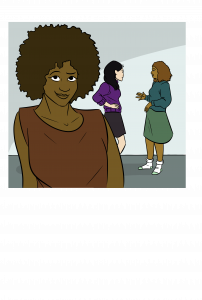 |
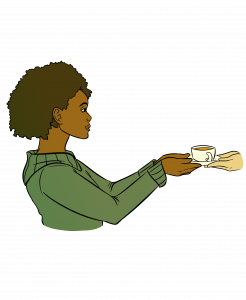 |
 |
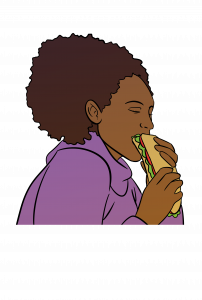 |
 |
| All’università, studio psicologia e mi piace molto. | Quando sono a Bologna, abito in un appartamento con due altre amiche, Francesca e Antonella. | La mattina, prendo sempre un caffè al bar sotto casa. | Dopo il caffè, frequento le lezioni fino a mezzogiorno. | A pranzo, mangio un panino in mensa. | Passo il pomeriggio in biblioteca. |
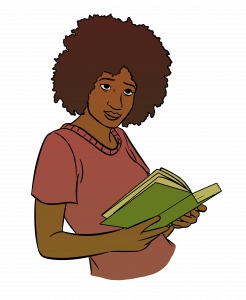 |
 |
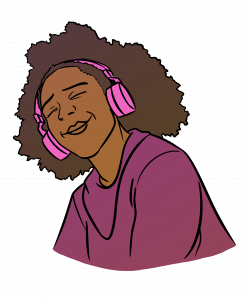 |
 |
 |
 |
| Leggo molti articoli per i miei corsi… | …e prendo molti appunti–mi piace scrivere! | Mentre studio, ascolto la musica. Preferisco la musica americana perché adoro il pop e anche l’inglese! | Sento mia madre al telefono mentre torno a casa. | Verso le 8, ceno con Francesca e Antonella e poi guardo Netflix prima di andare a dormire. | Di solito, dormo molto perché sono molto stanca alla fine della giornata! |
Esercizi
A. Cosa fa Valentina? Which of the following activities does Valentina do on a daily basis? Check all that apply.
| Ex. Studia la psicologia. | sì ✅ |
| Abita a casa con la sua famiglia. | |
| Prende il caffè al bar. | |
| Frequenta le lezioni la mattina. | |
| Mangia la pasta a pranzo. | |
| Legge molto per i suoi corsi. | |
| Ascolta la musica classica. | |
| Guarda la tv dopo cena. | |
| Dorme poco. |
B. E tu? Is your routine similar or different to Valentina’s? Check all the activities that apply to you.
| Studio psicologia. | |
| Abito in un appartamento. | |
| Prendo un caffè al bar. | |
| Frequento le lezioni la mattina. | |
| Mangio nella mensa dell’università a mezzogiorno. | |
| Passo il pomeriggio in biblioteca. | |
| Leggo molto per i miei corsi. | |
| Prendo appunti nel mio quaderno o sul mio computer. | |
| Ascolto la musica mentre studio. | |
| Preferisco la musica pop. | |
| Sento mia madre/mio padre al telefono ogni giorno. | |
| Ceno con i miei amici la sera. | |
| Guardo Netflix prima di andare a dormire. | |
| Dormo 8 ore a notte. |
C. Cosa fai tu? Now, tell your partner about your typical activities. Can you tell them what you do NOT do?*
*Study tip
Do you remember how to make the sentence negative? Just add “non” before the verb! Ex. Non studio la psicologia.
Here are some other things that Valentina does throughout the week. Do you do any of the same activities?
 |
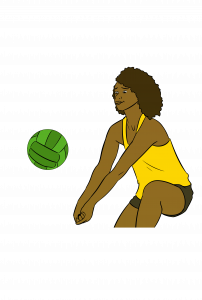 |
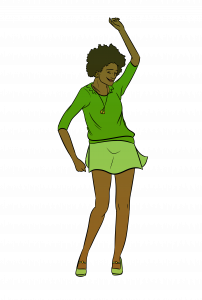 |
| Canto sotto la doccia. | Gioco a pallavolo. | Ballo in discoteca il sabato sera. |
 |
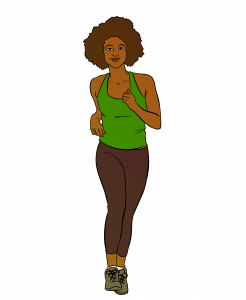 |
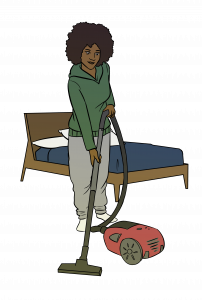 |
| Rispondo alle email. |
Corro nel parco. | Pulisco la mia camera da letto. |
Esercizi
D. Associazioni. Match each verb with its logical conclusion, based on context.
| Gioco | il New York Times ogni giorno. |
| Guardo | la finestra perché fa caldo. |
| Mangio | l’autobus per andare a lezione. |
| Leggo | a tennis. |
| Prendo | la mia casa perché è in disordine! |
| Scrivo | gli spaghetti. |
| Apro | una composizione per il corso d’italiano. |
| Pulisco | Stranger Things su Netflix. |
E. Altre possibilità? Can you change the sentences a little? In groups of 3, try to come up with other associations for the following activities. Which of these activities do you enjoy?
Ex. Studio psicologia→ studio matematica→ studio in biblioteca
Suono la chitarra→
Parlo con gli amici→
Ascolto la musica pop→
Guardo Netflix→
Abito in un appartamento→
Leggo degli articoli→
Scrivo una composizione→
Prendo il caffè→
Rispondo alle email→
Sento mia madre al telefono→
Preferisco la musica americana→
Dormo molto→
3.3 I verbi regolari nel presente -are, -ere, -ire
“Ho preso la chitarra e suono per te” 
Do you remember the subject pronouns from Capitolo 2? Circle or underline the subject of the verb above in bold from the song at the beginning of the chapter:
| io | tu | lui/lei/Lei | noi | voi | loro |
What about the other verbs from the song? Can you identify their subjects? How do you know?
Non chiedo di più.
| io | tu | lui/lei/Lei | noi | voi | loro |
Profumi anche tu.
| io | tu | lui/lei/Lei | noi | voi | loro |
Senti questa voce.
| io | tu | lui/lei/Lei | noi | voi | loro |
Chi canta è il mio cuore.
| io | tu | lui/lei/Lei | noi | voi | loro |
Can you identify any patterns in the conjugations here? What letter do the io conjugations end with? What letter do the tu conjugations end with? These two forms, along with the noi form, share endings among all three types of verbs in Italian. The lui/lei, voi, and loro forms differ slightly among -are, -ere, and -ire verbs.
L’infinito (The infinitive)
Speaking of -are, -ere, and -ire verbs, in the section 3.2 you identified the infinitive form of the verb for suono (suonare), chiedo (chiedere), and senti (sentire). Can you identify some other infinitives from the exercises in 3.2? Match the conjugated verbs to their infinitive forms below. Which verbs are -are, -ere, and -ire?
| parlo | scrivere |
| ascolto | pulire |
| scrivo | parlare |
| leggo | dormire |
| dormo | ascoltare |
| pulisco | leggere |
Why not start keeping track? Use the table below to keep a running list of the different verbs you encounter throughout the chapter (and beyond!) that belong to the three verb categories.
| -are | -ere | -ire |
| suonare
|
chiedere
|
sentire
|
Infinitives can be really useful for communication, even when they’re not conjugated! For example, you encountered the verb piacere in Capitolo 1. When you want to express that you like doing something in Italian, the formula is easy! All you have to do is add the infinitive form of the verb to mi piace, and you’ve communicated a complete thought! For example: Mi piace cantare sotto la doccia. Non mi piace pulire la mia camera da letto. See? Why don’t you try it?
Esercizi
A. Ti piace…? With a partner, ask each other if you like doing the following things. Follow the example, and pay attention to the infinitive forms (there might be some to add to the table above!)
Ex. Ti piace cantare sotto la doccia?
Sì, mi piace cantare sotto la doccia! / No, non mi piace cantare sotto la doccia.
Ti piace….
- ballare?
- ascoltare la musica rap?
- studiare italiano?
- mangiare la verdura?
- leggere i libri di fantascienza (science fiction)?
- prendere il caffè da Dunkin Donuts?
- pulire la tua camera da letto?
- giocare a tennis?
- guardare i programmi “reality”?
Study tip
As you learned in Capitolo 1, the verb piacere is pretty particular in Italian. It translates to “I like” in English, but in reality the verb functions completely differently. When you say mi piace il caffè, for example, what you are actually saying is that “coffee” is pleasing to me.” So “coffee” is the subject of the sentence, and “me” is the object. Weird, right?!? This is common to the Romance languages, and there are a few other verbs that work the same way. It also means that when the thing you like is plural, like “libri di fantascienza,” you would use plural form of the verb: Mi piacciono i libri di fantascienza. You will learn more about this in Parte II of this book, when you learn about indirect object pronouns (ooh, the anticipation!! 😉 ) Until then, just keep these tips in mind.
Le coniugazioni (Conjugations)
So how do we conjugate a verb in the present tense in Italian? First, you need to remove the ending (the -are, -ere, or -ire), which leaves you with the root of the verb. In the example of the verb suonare, we remove -are and are left with “suon” as the root of the verb. Then you attach the appropriate ending, or suffix, that corresponds with the subject of the sentence and the type of verb it is. The root itself does not change–only the endings do. See the similarities and differences among the forms in the table below.
| suonare | chiedere | sentire | |
| io | suono | chiedo | sento |
| tu | suoni | chiedi | senti |
| lui/lei/Lei | suona | chiede | sente |
| noi | suoniamo | chiediamo | sentiamo |
| voi | suonate | chiedete | sentite |
| loro | suonano | chiedono | sentono |
Look at the table above and try to identify the patterns. How do -are verbs differ from -ere and -ire verbs? How are -ere and -ire verbs similar? How are they different?
Note that each subject has its own corresponding conjugated form. This is very different from English, where almost all of the subjects use the same form of the verb, with the exception of the he/she/it form (think about it! I play, you play, he/she/it plays, we play, you all play, they play). This is why it is not always necessary to use the subject pronoun itself in a sentence–it is clear that you are talking about “they,” for example, just by the form of the verb you use.
Le giornate di Francesca e Antonella
Valentina is going to describe her roommates and their typical activities. Read the paragraph and pay attention to the words in bold. Can you see the differences between the -are, -ere, and -ire forms? Based on the patterns, and what you know about finding the root of the verb, can you identify the infinitives of the verbs in italics?
Francesca e Antonella sono brave compagne di casa, ma sono persone molto diverse. Francesca, per esempio, studia letteratura, ed è molto pragmatica e ordinata. Legge libri di fantascienza e di fantasia, e risponde sempre alle email puntualmente, pulisce la sua camera da letto tutti i giorni, e finisce i suoi compiti prima di cena. Antonella, invece, studia matematica e ha un po’ la testa fra le nuvole (head in the clouds). Dorme fino alle 11 o mezzogiorno, e ascolta la musica sempre ad un volume altissimo (lei adora Malika Ayane!). Però tutte e due sono brave a cucinare e preparano sempre piatti deliziosi come le lasagne e i tortellini in brodo. Noi mangiamo molto bene a casa! Francesca e Antonella preferiscono cucinare, così io lavo i piatti! Guardiamo la tv insieme dopo cena, oppure giochiamo a carte. Francesca e Antonella sentono le loro famiglie tutti i giorni al telefono, e quando arriva il weekend, prendono il treno e tornano a casa per passare il tempo con loro. Di solito, torniamo tutte a Bologna il lunedì mattina e cominciamo di nuovo la nostra routine.
Can you complete the table below based on the paragraph and the patterns you have identified?
| preparare | prendere | dormire | |
| io | |||
| tu | |||
| lui/lei/Lei | |||
| noi | |||
| voi | |||
| loro |
There you go–you know how to conjugate regular verbs in Italian! Now you have so much more to say! There are, of course, a few small…irregularities to be aware of. Look at these sentences and see if you notice any spelling changes:
Giochiamo a carte.
Mangiamo bene.
Cominciamo di nuovo la nostra routine.
In the first example, you can see that an “h” was added before the -iamo ending. This is to preserve the hard “c” sound. All verbs that end in -care (like giocare and cercare) and -gare (like pagare) add an “h” to the tu and noi forms for this reason. See the whole conjugation below, and then give the verb in the third column a try:
| giocare | pagare | cercare | |
| io | gioco | pago | |
| tu | giochi | paghi | |
| lui/lei | gioca | paga | |
| noi | giochiamo | paghiamo | |
| voi | giocate | pagate | |
| loro | giocano | pagano |
With -care and -gare verbs, you add a letter, but verbs that end in -ciare (like cominciare) and -giare (like mangiare and viaggiare) lose a letter. Since the tu and noi forms already contain an “i” before the ending, it is not necessary to add another (mangiiamo is not easy to say!!) One of the two “i”s can be eliminated. See the table below, and then give the verb in the third column a try!
| mangiare | cominciare | viaggiare | |
| io | mangio | comincio | |
| tu | mangi | cominci | |
| lui/lei/Lei | mangia | comincia | |
| noi | mangiamo | cominciamo | |
| voi | mangiate | cominciate | |
| loro | mangiano | cominciano |
These are small changes to pay attention to, but there are slightly bigger differences when it comes to -ire verbs. Look at these examples from the paragraph above:
Pulisce la sua camera da letto tutti i giorni.
Finisce i suoi compiti prima di cena.
Dorme fino alle 11.
All of the verbs in these three examples are -ire verbs (pulire, finire, and dormire), but you will notice that the conjugations for pulire and finire look a bit different. This is because -ire verbs actually have two different conjugations, depending on the verb. Both are regular, you just have to learn which ones conjugate which way. Verbs that conjugate like dormire or sentire are nearly identical to verbs ending in -ere, with the exception of the voi form. Verbs that conjugate like pulire, on the other hand, add the letters “isc” before the traditional endings. Note that the noi and voi forms do not require the addition of the “isc”, just like the shoe verbs you learned about in Capitolo 2.
| dormire | pulire | |
| io | dormo | pulisco |
| tu | dormi | pulisci |
| lui/lei/Lei | dorme | pulisce |
| noi | dormiamo | puliamo |
| voi | dormite | pulite |
| loro | dormono | puliscono |
Also note the pronunciation of the forms, which changes from a hard “c” sound in the io and loro forms to a soft “sh” sound in the tu and lui/lei forms.
So how do you know which conjugation to use? Learning them by memory is a good start. Here are the most typical “isc” verbs you should know:
pulire
finire
preferire
capire
spedire
Give it a try! Complete the conjugation table below:
| finire | |
| io | |
| tu | |
| lui/lei/Lei | |
| noi | |
| voi | |
| loro |
Study tip
 Another “trick” to distinguish between two -ire conjugations is the “counting back” trick. If you count five letters back from the end and the letter is a vowel, then it is an “isc” conjugation. If the letter is a consonant, then it’s a regular -ire conjugation. This trick does not always work, but it can be helpful!
Another “trick” to distinguish between two -ire conjugations is the “counting back” trick. If you count five letters back from the end and the letter is a vowel, then it is an “isc” conjugation. If the letter is a consonant, then it’s a regular -ire conjugation. This trick does not always work, but it can be helpful!
Esercizi
B. Che cosa fanno? Underline or circle the correct form from the choices in parentheses.
Ex. Voi (apre / aprono / aprite) i libri a pagina 33.
- Io e Antonella (guardo / guarda / guardiamo) Netflix tutte le sere.
- Francesca (studio / studi / studia) la matematica.
- Francesca e Antonella (prepariamo / preparate / preparano) la cena.
- Io (prendo / prendi / prende) un caffè al bar sotto casa.
- E tu, (abito / abiti / abita) in un appartamento con le tue amiche?
- Antonella e Francesca, (dormiamo / dormite / dormono) molte ore la notte?
C. Quante cose da fare! Valentina, Francesca and Antonella are getting ready for a particularly busy week. Complete the sentences with the correct form of the verb in parentheses.
Ex. Tu __pulisci_____________ (pulire) la tua camera da letto.
- Io _________________________________________________________ (lavorare) in biblioteca lunedì mattina alle 9.
- Noi _________________________________________________________ (frequentare) le lezioni dalle 10 alle 15.
- Antonella _________________________________________________________ (scrivere) due composizioni per il corso di letteratura.
- Francesca _________________________________________________________ (finire) un progetto per il corso di biologia.
- Io e Antonella _________________________________________________________ (giocare) a carte tutte le sere.
- Francesca e Antonella _________________________________________________________ (prendere) l’autobus per tornare a casa alle 5.
- Tu _________________________________________________________ (spedire) una lettera all’ufficio postale dopo lezione.
- Tu e Francesca _________________________________________________________ (vedere) un film al cinema sabato sera.
- Io _________________________________________________________ (leggere) un articolo per il corso di psicologia.
- Francesca e Antonella _________________________________________________________ (cominciare) a studiare per l’esame di chimica.
D. La mia settimana.
Parte I. Do you have a lot to do this week as well? Write at least five different activities in the calendar below.
Ex. Mercoledì gioco a tennis con gli amici.
| lunedì | martedì | mercoledì | giovedì | venerdì | sabato | domenica |
|
|
||||||
|
|
||||||
|
|
| lunedì | martedì | mercoledì | giovedì | venerdì | sabato | domenica |
|
|
||||||
|
|
||||||
|
|
E. Giochiamo con i dadi! Working in groups of 2-3 and in consultation with the verb list at the end of this chapter, your instructor will give you a dice. Taking turns, start at the top of the verb list and roll the dice. The number you roll will provide you with the subject to go with the verb in the list–putting the two together, form a complete (logical!) sentence.
Ex. 4 – parlare → Noi parliamo italiano!
1- io
2- tu
3- lui/lei/Lei
4- noi
5- voi
6- loro
3.4 Gli interrogativi
You have already encountered several interrogatives, or question words, over the course of the last three chapters. These are the words that typically begin a question, such as Come stai? or Quando è il tuo compleanno? Match the question to its logical answer below based on the interrogative.
| Dove abiti? | È la mia compagna di casa. |
| Che cosa studi? | Lunedì mattina. |
| Chi è Francesca? | In un appartamento a Bologna. |
| Quando hai la lezione di inglese? | Psicologia. |
These are some of the principal interrogatives that you have encountered throughout the last three chapters:
| chi | who |
| che cosa/cosa/che | what |
| dove | where |
| quando | when |
| perché | why |
| come | how |
Here are some others that you have seen. Can you explain the differences between these examples?
Quanti anni hai?
Quante sorelle hai?
Quanto zucchero metti nel caffè?
Quanta pasta prepari per pranzo?
Quanto is an interrogative that agrees in gender and number with the word that follows it, which means it has four forms (masculine singular, feminine singular, masculine plural, feminine plural). When it is singular, as in Quanto zucchero metti nel caffè?, it means how much, and when it is plural, as in Quante sorelle hai?, it means how many.
Qual è la tua pasta preferita?
Quale pasta preferisci?
Quali libri preferisci?
Quale is another interrogative that needs to agree in number with the word that follows it. Since it ends in an -e, just like the adjectives you learned about in Capitolo 2, it only has one singular form for both masculine and feminine words, and one plural form (in which the -e becomes an -i). If it does not modify a word, like the first example above, then it is invariable and drops the final -e.
Esercizi
A. Quanto, quanto, quanto. Write the correct form of the interrogative quanto in the appropriate blank to complete the question.
Ex. Quanti anni hai?
- ____________________ corsi hai questo semestre?
- ____________________ lezioni hai il lunedì?
- ____________________ fratelli hai?
- ____________________ costa il biglietto per il concerto?
- ____________________ persone abitano nel tuo dormitorio/appartamento/casa?
- ____________________ acqua bevi (do you drink) ogni giorno?
- ____________________ write an original question with “quanto”!
B. Parliamo! Now that you have your questions ready, take turns asking and answering them with a partner.
C. Quale preferisci? Write the correct form of quale in the appropriate blank to complete the question.
Ex. Quali materie studi?
- ____________________ lingue straniere parli?
- ____________________ animali domestici hai?
- ____________________ colore preferisci?
- ____________________ programmi televisivi guardi?
- ____________________ sport ti piace?
- ____________________ pasta mangi?
- ____________________ write an original question with “quale”!
D. E tu? Now that you have your questions ready, take turns asking and answering them with a partner.
E. Giochiamo a Tris! Watch the following video and then, working in pairs, create nine questions based on what you saw, according to the table below.
| Perché | Chi | Come |
| Quando | Che cosa | Dove |
| Quando | Quanto/a/i/e | Quale/i |
Now it’s time to play! The board above is your “tic-tac-toe” (or tris, in Italian) board. Each group chooses one space according to its interrogative, and in order to “win” the space, they must respond to the question in an appropriate fashion (i.e. if the question is asking about a place, and they respond accordingly, even if the place itself is incorrect).
3.5. L’ora
Che ora è? / Che ore sono?

Sono le dieci e dieci.
Interrogatives are also helpful to ask about time. Telling time in Italian is not so different from telling time in English. Sometimes there is even more than one correct answer–you can choose whichever method works best for you, but the important thing is to be able to understand when someone answers you!
As you can see in the example above, the verb essere is used when we tell time. The definite article le is also important and necessary! Le is used here because it represents “le ore”, which is feminine and plural.

In Italian the clock is divided into four parts, or four quarters of an hour. As a general rule, we “add” minutes on the right side of the clock (using e) like in Sono le dieci e dieci (10:10), and on the other side of the half hour (mezzo) we subtract from the upcoming hour using meno like in Sono le dieci meno dieci (9:50). It is also okay to only add, like in Sono le nove e cinquanta (9:50), but meno is not used in the same way.
Che ore sono?


| Sono le due e mezzo. Sono le due e trenta. Sono le quattordici. |
Sono le dodici. È mezzogiorno./È mezzanotte. |
Look at the examples above. Match the terms with their appropriate times.
| Sono le quattordici. | 12 pm |
| È mezzogiorno. | 12 am |
| È mezzanotte. | 2 pm |
From these examples, you might notice a couple of things. First, “le quattordici” is an example of the 24 hour clock, which is very common in Italy for timetables, schedules, etc… Just add 12 to the number and you have the 24 hour time. Also, notice the “è” instead of “sono” with mezzogiorno and mezzanotte. The singular form of the verb is used with these two words. The other time the singular form is used when telling time? When referring to “one o’clock”, since one is naturally a singular hour (Ex. È l’una e un quarto – 1:15).
Esercizi
A. Che ore sono? Match the written time with its digital equivalent.
| Sono le quattro e mezzo. | 12:05 pm |
| Sono le undici meno un quarto. | 12:50 am |
| Sono le tredici e venti. | 4:30 am |
| È mezzogiorno e cinque. | 10:00 pm |
| Sono le ventidue. | 10:45 am |
| È l’una meno dieci. | 1:20 pm |
B. Che ora è? Write the times.
Ex. 3:10 am→Sono le tre e dieci.
- 6:00 am _____________________________________________
- 8:20 pm _____________________________________________
- 12:15 pm _____________________________________________
- 2:30 pm _____________________________________________
- 2:45 am _____________________________________________
- 1:35 am _____________________________________________
- 7:25 pm _____________________________________________
- 10:55 pm _____________________________________________
C. Che ore sono a….? With a partner, take turns asking each other what time it is in different parts of the world.
Ex. Che ore sono a Roma? Sono le …*
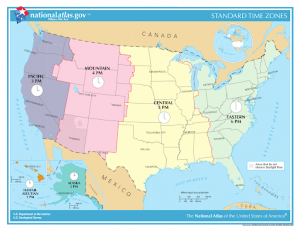

*Nota culturale
For most of the year, Italy is 6 hours ahead of the eastern US.
D. Scusa, sai che ore sono? Roleplay the following dialogue with multiple classmates, changing the time and other appropriate information as you wish.
S1: Buongiorno! Scusa, sai che ore sono?
S2: Certo, sono le ___________.
S1: Grazie mille!
S2: Prego! Arrivederci!
A che ora?

A che ora inizia la lezione d’italiano?
-La lezione d’italiano inizia alle dieci e dieci.
As in English, there is a difference between the questions “Che ore sono?” (What time is it?) and “A che ora…?” (At what time…?). To respond to the question “A che ora”, use alle, all’ or a and then the appropriate time, as in the example above. The same response can also often be used for questions beginning with Quando…?
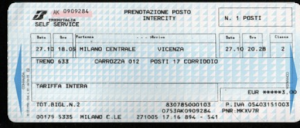
A che ora parte il treno da Milano Centrale? -Il treno parte alle diciotto e cinque.
Quando arriva il treno a Vicenza? -Il treno arriva alle venti e ventotto.
Esercizi
E. L’orario di Valentina. Study Valentina’s schedule for the next week and answer the questions that follow in complete sentences.
| lunedì | martedì | mercoledì | giovedì | venerdì | |
| 10:00 am | lezione di inglese | lezione di inglese | esame di biologia | lezione di inglese | |
| 12:00 pm | pranzo con Fede | ||||
| 2:30 pm | caffè con Francesca | lavoro in biblioteca | rispondere alle email della settimana | ||
| 4 pm | incontro con il prof. d’inglese | lavoro in biblioteca | |||
| 6 pm | pulire la casa | partita di pallavolo | |||
| 8 pm | cinema con Fede | cena a casa di Fede |
- A che ora incontra il professore d’inglese martedì? ________________________
- A che ora cena a casa di Fede venerdì? ________________________________
- Quando gioca a pallavolo? __________________________________________
- Quando pulisce la casa? ____________________________________________
- Quando ha la lezione d’inglese? ______________________________________
- A che ora prende un caffè con Francesca lunedì? ________________________
F. Continua la conversazione! Working in pairs and following the formula of the questions above, ask each other about Valentina’s schedule for the week.
G. E la tua settimana? Tell your partner what your week looks like. Give at least five examples of specific things you are going to do at specific times.
Ex. Sabato alle 11 gioco a tennis con la mia amica.
1.
2.
3.
4.
5.
3.6 Guardiamo!
La grande bellezza (Sorrentino 2013)
Nota culturale
La grande bellezza (The Great Beauty), directed by Paolo Sorrentino, won the Academy Award for Best Foreign Film in 2014. It tells the story of Jep Gambardella, a writer and member of Roman artistic “high society,” who takes stock of his life following his 65th birthday.
Esercizi
A. Cosa fanno? Watch the scene of Jep Gambardella’s birthday party from the film La grande bellezza (Sorrentino 2013). Put an ✅ next to the actions you observe in the scene.
| Alcune persone cantano. | |
| Le persone parlano molto. | |
| C’è un gruppo di mariachi che suona. | |
| Ci sono molte persone che ballano. | |
| Mangiano la torta di compleanno. | |
| Jep fuma una sigaretta. | |
| Tutti sorridono molto. | |
| Cantano “Tanti auguri a te”. | |
| Jep apre i regali ricevuti dai suoi amici. | |
| Ad un certo punto, Jep diventa serio. |
B. Descriviamo! In pairs, describe the people in the scene. First, describe the guests at the party: what are they like, what are they wearing, how old are they, etc… Then, describe Jep: how is he similar or different from the others?
Ex. Gli invitati alla festa sono felici.
C. Come sono le tue feste di compleanno? In groups of 3, discuss your own birthday parties. When is your birthday and how do you like to celebrate it? Are your parties similar to or different from Jep’s?
Ex. Il mio compleanno è l’8 agosto. Non mi piace organizzare grandi feste. Preferisco andare al mare con 2 o 3 amici.
D. Cosa dicono? It is true that this scene does not contain much dialogue. But if it did, what would the participants be saying to each other? In small groups, write an imagined conversation between different invitati at the party. Be creative and have fun!
Ex. Invitato 1: Wow, questa festa è molto divertente!
Invitato 2: Mamma mia, ballare è così stancante! Ho voglia di dormire!
3.7 Punto culturale: Silvio Berlusconi e i media
Silvio Berlusconi, A Man Already Stranger Than Fiction, Gets A Biopic: ‘Loro’
A. Domande di comprensione. Read the article above and answer the following questions.
- Who is Silvio Berlusconi?
- What is/was particular about his approach? Why has it become a sort of blueprint for others to follow?
- What is the significance of the title of the film (not the translation, but what is represents)?
- According to Ruth Ben-Ghiat, what two things did Berlusconi understand how to meld particularly well, and what were/are the consequences that came from it?
- In particular, how does Sorrentino depict Berlusconi’s relationship with women in the film? Why is this significant?
B. Discussione. Discuss the following questions with a partner.
- How does Berlusconi’s story relate to the situation in other countries? Can you draw any parallels with your own country?
- What is your own relationship with the media (television, newspapers, social media)? What is your “media diet”? What kind of influence do you think these different forms of communication have on a society?
- Do you know much about Italian politics? Do you follow international politics at all? Why or why not?
Nota culturale
In Italy there have long been two primary telecommunications companies: the RAI (Radiotelevisione italiana) and Mediaset (and now also Sky Italia, a satellite platform). The RAI is a public company and is therefore controlled by the Ministero dell’Economia e delle Finanze (a part of the Italian government). It offers several channels (RAI 1, RAI 2, RAI Movie, RAI Sport, etc…) Every Italian household pays the “canone” (annual fee) for the RAI each year. Mediaset, on the other hand, is a private company founded by ex-Prime Minister Silvio Berlusconi. It offers free channels, like Canale 5, Rete 4, and Italia 1, and also pay per view channels. This means that when Berlusconi was prime minister, he controlled both the RAI and Mediaset. At the time it was almost 90% of Italian television. Mediaset’s channels, especially Italia 1, have a lot of American programs dubbed over in Italian. Subtitles are not that common on Italian television and in Italian films–dubbing is its own industry! The same voice actor is often used for all films featuring a specific actor. For example, George Clooney is always dubbed by the same person, so when Italians hear George Clooney’s REAL voice, it can be very strange!
For more information on the Italian television system, read here: The Italian Television System Explained
C. Guardiamo la tv!
Parte I. Working in groups of 2-3, visit the websites of the RAI (https://www.raiplay.it/guidatv and Mediaset https://www.mediasetplay.mediaset.it/guidatv) and look at their tv guides. Are there American shows with which you are familiar? Then, take turns pointing out what time certain shows come on, and on what channel. Follow the formula below.
Ex. Alle 20 su Rai 2 c’è N.C.I.S.
Parte II. Now, discuss what you observed in your search. Answer the following questions in Italian.
- Come si chiama l’azienda televisiva pubblica in Italia?
- Come si chiama l’azienda televisiva privata?
- Cosa pagano gli italiani per avere la RAI?
- Nel tuo paese, quante aziende televisive ci sono?
- Le piattaforme (platforms) che guardi sono a pagamento o sono gratuite?
- La tv in Italia è simile o diversa dalla tv nel tuo paese?
Ripasso del capitolo
At the end of this chapter, you should be able to:
- identify typical activities and actions
- talk about your hobbies and pastimes
- describe your typical daily activities
- ask about the hobbies and routines of your classmates
- formulate questions based on observation
- tell time
- read a schedule or timetable
- identify some similarities and differences between Italian television and the television in your country
Prove it!
Il vocabolario
| italiano | English |
| Attività e passatempi
cucinare sorridere Frasi utili Interrogativi |
Activities and pastimes
to live / to reside to open to arrive to listen to to dance to sing to understand to eat dinner to search/look for to ask to close to begin/to start to know/to be familiar with to run to cook to sleep to finish to attend to play (a game, a sport) to watch to meet/to encounter to begin to wash to work to read to eat to pay to speak to leave/to depart to pass/to spend (time) to eat lunch to practice to prefer to take to prepare to perfume/to smell good to clean to respond to write to hear to serve to smile to send to study to play (a musical instrument) to return to see to travel Useful phrases What time is it? It’s eleven o’clock. It’s one o’clock. It’s noon. It’s midnight. It’s ten thirty. It’s five fifteen (five and a quarter). At what time? At 2 pm. At 1 pm. morning afternoon evening night Interrogatives who what where when why how how much how many which |
3.3 1. io; 2. chiedo – io, profumi – tu, senti – tu, canta – lui/lei/Lei. The last letter helps to identify the subject. The io form ends with “o” and the tu form ends with “i”; 3. parlo – parlare, ascolto – ascoltare, scrivo – scrivere, leggo – leggere, dormo – dormire, pulisco – pulire; 4. -are verbs differ from -ere and -ire verbs in the lui/lei/Lei, voi, and loro forms. -Ere and -ire verbs differ in the voi form.
5.
| preparare | prendere | dormire | |
| io | preparo | prendo | dormo |
| tu | prepari | prendi | dormi |
| lui/lei/Lei | prepara | prende | dorme |
| noi | prepariamo | prendiamo | dormiamo |
| voi | preparate | prendete | dormite |
| loro | preparano | prendono | dormono |
6. cercare
| io cerco | noi cerchiamo |
| tu cerchi | voi cercate |
| lui/lei/Lei cerca | loro cercano |
7. viaggiare
| io viaggio | noi viaggiamo |
| tu viaggi | voi viaggiate |
| lui/lei/Lei viaggia | loro viaggiano |
8. finire
| io finisco | noi finiamo |
| tu finisci | voi finite |
| lui/lei/Lei finisce | loro finiscono |

